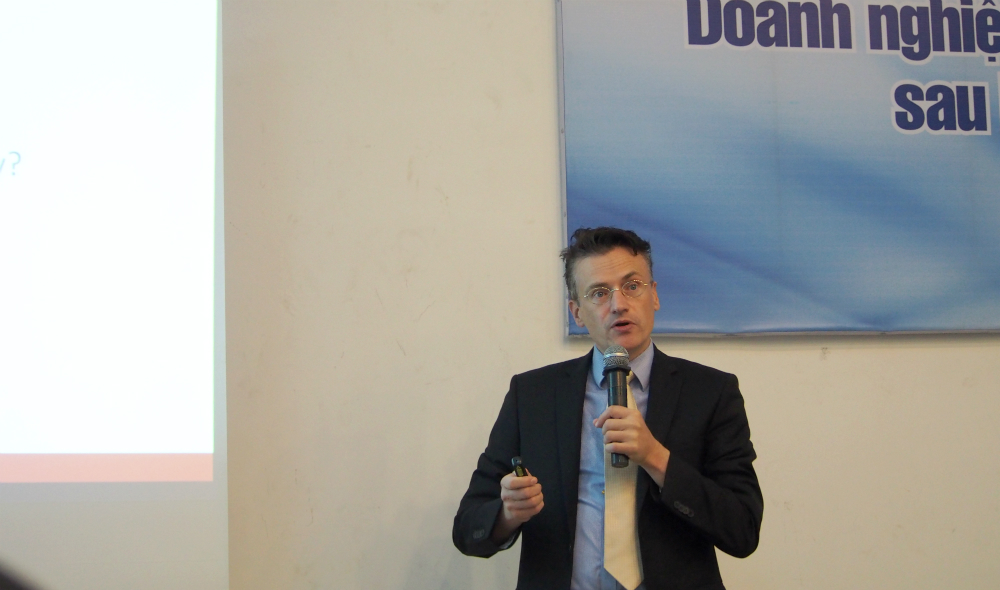The expected formal signing of a free trade agreement between Vietnam and the European Union (EU) will be an important step forward, but it is more necessary to strengthen business connections to bring benefits to the two sides, an expert said at a workshop in Ho Chi Minh City on Thursday.
Vietnam and the EU on August 4 reached agreement in principle for a free trade pact after concluding many sessions of negotiations from June 2012 to August 2015, with a view to ensuring an effective environment for trade and investment relations.
The in-principle trade deal includes the elimination of nearly all tariffs, at over 99 percent, for the two sides, in which Vietnam will liberalize the tariffs over a 10-year period and the EU will do so over a 7-year period.
The agreement also covers non-tariff barriers to trade and other trade-related aspects such as public procurement, regulatory issues, competition, services, investment, intellectual property rights and sustainable development.
Currently, as Vietnam and the EU ended negotiations on the pact, the next step is that all the relevant parties will prepare a formal agreement, and each party must sign this document, said Andreas Stoffers, professor of business administration and the head of the ASEAN Institute of Research at the Munich University of Applied Languages (Germany).
This agreement will enter into force after ratification by all parties, including Vietnam, the EU, and individual EU members, and these steps usually take some time, the German professor said at the "Multicultural Management: What Vietnamese Businesses Need to Pay Attention to After EU-Vietnam FTA" workshop.
Linking up
To take advantage of this agreement, Vietnamese businesses need to be more proactive in preparing to connect with European partners, including German firms, Professor Stoffers, who used to serve as director of Deutsche Bank in Vietnam, said.
For the Asian market, German people mainly know China, while many Germans often think of Thailand when asked what they know about Vietnam, he added.
As a result, it is important to strengthen relations between Vietnam and Germany to understand each other better by establishing groups of experts and advisors from both sides to bolster their connections.
Germany is an important market for Vietnam. In 2014, Vietnam’s exports to Germany reached eight billion euros, while its imports from that country topped two billion euros.
To connect with German and European firms, Vietnamese companies can get support and information from the German Chamber of Commerce and other European business chambers in Vietnam, Professor Stoffers said.
Local businesses can attend events and meetings arranged by those chambers to have the opportunity to meet entrepreneurs from Germany at negligible participation costs.
Enterprises can also partake in trade fairs held regularly in their targeted European market, the professor said.
One more important thing is that Vietnamese enterprises should get familiar with the business culture of Germany and the EU and find reliable partners.
According to the German professor, Vietnamese enterprises should note that German firms tend to be outspoken and confrontational so they often speak bluntly when negotiating a certain matter.
In 2015, Vietnam and Germany celebrate 40 years of diplomatic relations, and the agreement on strategic partnership between the two countries was signed in October 2011.
However, the presence of German firms in the Southeast Asian country is still quite modest, with about 600-700 investors – compared to 2,000 enterprises from South Korea, a much smaller economy compared to Germany – doing business in Vietnam.
Vietnam and Germany have many similarities, laying the foundation for good growth in the future, and the Vietnamese community in the European country is quite large and has much to contribute to German society, Professor Stoffers said.
Untapped potential
In Europe, in general, and Germany, in particular, the Association of Southeast Asian Nations (ASEAN) is recognized as one of the fastest-growing regions in the world, with an average GDP growth rate of six percent a year for the last 15 years.
ASEAN is a ten-member bloc which includes Indonesia, Malaysia, the Philippines, Singapore, Thailand, Brunei, Cambodia, Laos, Myanmar and Vietnam.
The ASEAN Economic Community, slated for establishment by the end of this year, will be a stimulus for the development of the ASEAN countries.
However, the main partners of ASEAN today are still China, Japan, and South Korea.
Meanwhile, Europe has yet to fully tap into the potential of ASEAN, and Germany, though it is currently the biggest trading partner of ASEAN, has yet to grasp all its opportunities there.
According to Professor Stoffers, the business sectors that German firms can invest in in ASEAN and Vietnam include renewable energy, recycling and waste water treatment, smart grid technology, green building, education, healthcare and pharmaceuticals, and agriculture for export to Germany.
Like us on Facebook or follow us on Twitter to get the latest news about Vietnam!





















































